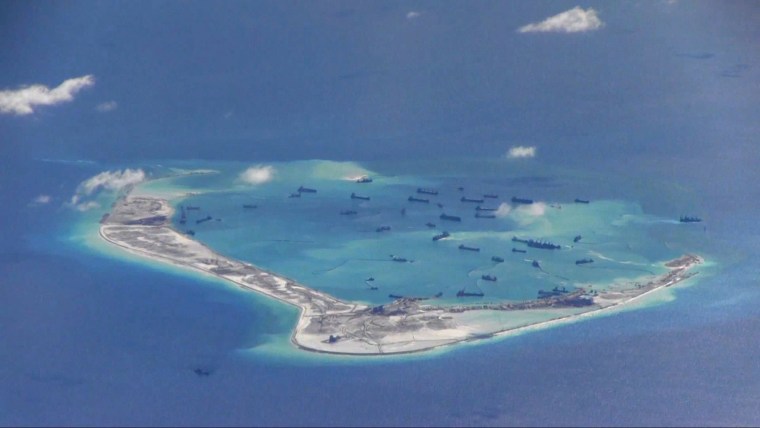WASHINGTON — China has been conducting a series of anti-ship ballistic missile tests in the hotly contested waters of the South China Sea, according to two U.S. officials with knowledge of the matter.
The Chinese carried out the first test over the weekend, firing off at least one missile into the sea, one official said. The window for testing remains open until July 3, and the official expects the Chinese military to test again before it closes.
While the U.S. military has ships in the South China Sea, they were not close to the weekend test and are not in danger, the official said, adding that the test however is "concerning." The official, who was not authorized to speak about the testing, could not say whether the anti-ship missiles being tested represent a new capability for the Chinese military.
The development comes as the United States and China have paused tensions in their ongoing trade battle. President Donald Trump and Chinese President Xi Jinping agreed over the weekend at the G-20 summit in Japan to not impose new tariffs on each other's goods. A trade deal between the two countries fell through in the beginning of May.
The South China Sea, which is home to more than 200 specks of land, serves as a gateway to global sea routes where approximately $3.4 trillion of trade passes annually.
The numerous overlapping sovereign claims to islands, reefs and rocks — many of which disappear under high tide — have turned the waters into an armed camp. Beijing holds the lion's share of these features with approximately 27 outposts peppered throughout.
In a statement, Pentagon spokesman Lt. Col. Dave Eastburn said "of course" the Pentagon was aware of the missile launch. "What’s truly disturbing about this act is that it’s in direct contradiction to President Xi’s statement in the Rose Garden in 2015 when he pledged to the U.S., the Asia-Pacific region and the world that he would not militarize those man-made outposts."
"I’m not going to speak on behalf of all the sovereign nations in the region, but I’m sure they agree that the PRC’s behavior is contrary to its claim to want to bring peace to the region and obviously actions like this are coercive acts meant to intimidate other South China Sea claimants."
In May 2018, China quietly installed anti-ship cruise missiles and surface-to-air missile systems on three of its fortified outposts west of the Philippines in the South China Sea, a move that allows Beijing to further project its power in the hotly disputed waters, according to sources with direct knowledge of U.S. intelligence reports.
According to U.S. intelligence reports, the installations mark the first Chinese missile deployments to Fiery Cross Reef, Subi Reef and Mischief Reef in the Spratly Islands. The Spratlys, to which six countries lay claim, are located approximately two-thirds of the way east from southern Vietnam to the southern Philippines.
By all accounts, the coastal defense systems represent a significant addition to Beijing's military portfolio in one of the most contested regions in the world.
The United States has remained neutral — but expressed concern — about the overlapping sovereignty claims to the Spratlys.
Still, the United States and China have disagreed over several issues regarding the South China Sea.
"China does need to have necessary defense of these islands and rocks which we believe are Chinese territory," high-ranking Chinese Col. Zhou Bo told CNBC in June. His remarks came after then-acting U.S. Defense Secretary Patrick Shanahan said America would no longer "tiptoe" around Chinese behavior in the region.
Amanda Macias covers the Pentagon for CNBC. Courtney Kube is an NBC News correspondent covering national security and the Pentagon.

